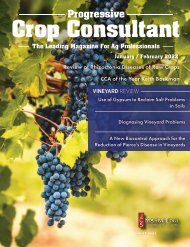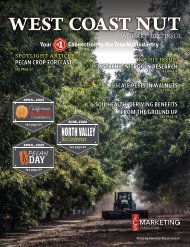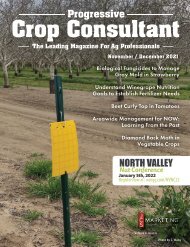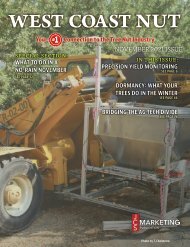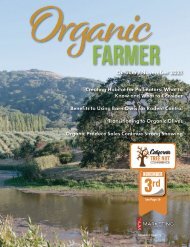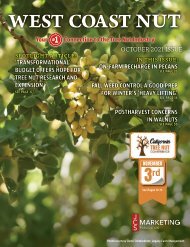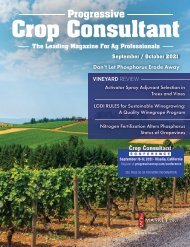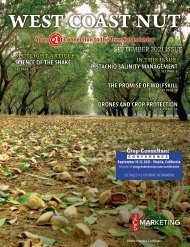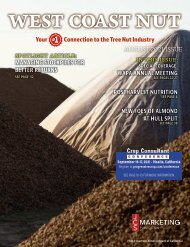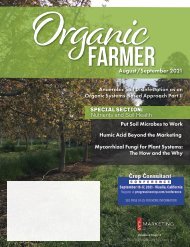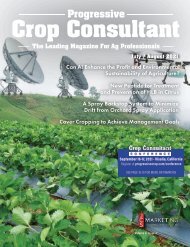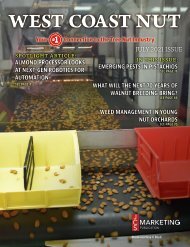Create successful ePaper yourself
Turn your PDF publications into a flip-book with our unique Google optimized e-Paper software.
Continued from Page 69<br />
pest control advisors should begin<br />
scouting for adult LFB in March. If LFB<br />
are present in the orchard, they are<br />
more likely to be found on the sunny<br />
side of the tree. No lures or attractants<br />
are available to monitor for LFB<br />
presence, Tollerup said, but observing<br />
adults, and finding signs of feeding on<br />
nuts would indicate a need for control.<br />
Pistachio growers and pest control<br />
advisors should look for adult LFB in<br />
April and May when they move into<br />
orchards to feed and lay eggs. There<br />
is no economic threshold for LFB<br />
in pistachio, Tollerup said. If adults<br />
are observed in the trees, growers<br />
or managers will have to decide if<br />
the numbers warrant a pesticide<br />
application.<br />
The most effective control materials<br />
for LFB are pyrethroids due to their<br />
residual activity. Tollerup said these<br />
Keep Birds Out<br />
GUARANTEED<br />
“I’ve used Bird Gard<br />
for years to protect my<br />
growers’ crops and keep<br />
birds from damaging<br />
the irrigation.<br />
Bird Gard works, what<br />
more can I say?”<br />
Tim Peltzer<br />
Peltzer Farm Management<br />
Terra Bella, CA<br />
Bird Gard is the ONLY bird control with a<br />
1-YEAR UNCONDITIONAL MONEY-BACK GUARANTEE<br />
888-332-2328 www.BirdGard.com<br />
Guaranteed Bird Control for over 30 Years!<br />
products, if applied correctly, could<br />
provide control. Other management<br />
strategies include removal of host<br />
plants if possible. Removal of weedy<br />
areas that serve as a food source during<br />
winter months can also help keep LFB<br />
numbers down.<br />
Both pest control advisor Justin<br />
Nay and University of California<br />
Cooperative Extension (UCCE) specialist<br />
Houston Wilson agreed that almond<br />
and pistachio blocks with a history<br />
of LFB infestations are most likely to<br />
have recurring infestations. This year<br />
appears to be a light year for LFB, Nay<br />
said. Infestations that were found were<br />
in the blocks in areas that get them<br />
almost every year. Total amount of nuts<br />
lost for his growers was very small, with<br />
the worst blocks losing less than one<br />
percent.<br />
In April a few of the almond blocks<br />
Nay watches had enough LFB to justify<br />
a treatment, but the total was only<br />
a small fraction of blocks under his<br />
supervision. Blocks were in both the<br />
north and south and in areas that get<br />
LFB every year.<br />
Nay’s pistachio blocks were just starting<br />
to meat fill in early July, and it was<br />
too early for LFB to move into that crop.<br />
Research<br />
Wilson has been part of a research<br />
effort to find an effective trap and<br />
attractant for LFB to improve monitoring.<br />
This information can fill a critical<br />
gap in control as predicting population<br />
densities and overwintering survival<br />
early in the season can assist with<br />
control efforts.<br />
While use of pyrethroids has been<br />
an effective control measure, resistance<br />
to that material has built in navel<br />
orangeworm and growers are using<br />
more targeted pesticides that are not as<br />
effective as pyrethroids on LFB.<br />
He said the hanging panel trap is<br />
currently being used as a platform to<br />
test various types of lures. Lures are<br />
both pheromone based and host plant<br />
volatile based.<br />
Comments about this article? We want<br />
to hear from you. Feel free to email us at<br />
article@jcsmarketinginc.com<br />
70<br />
<strong>West</strong> <strong>Coast</strong> <strong>Nut</strong> <strong>September</strong> <strong>2019</strong>




